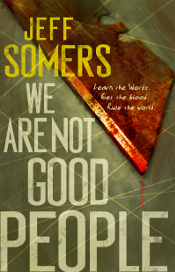This year at the 2015 Writer’s Digest Annual Conference, I’ll not only be offering up my presentation on plotting a novel (which was really well-received last year and which will be 150% more awesome this year because I plan to be sober this time) I’ll also be attending the cocktail reception and signing copies of We Are Not Good People (the plotting of which I discussed last year in a WDAC-related post). It’s my understanding that the conference is sold out, so this isn’t really me drumming up attendance (and yes, I fully expect to be sitting there alone, nursing a drink and weeping when absolutely no one buys my book to get signed).
If you’ve read WANGP, then you know the ending sort of folds back on the story, and the ending has been a divisive aspect of the story for some. It was very deliberate, though; Despite the fact that the whole book was more or less pantsed (that is, made up as I went, as opposed to being planned out) I did have the ending in mind as I wrote. As the story progressed, it became clearer and clearer to me that this was the only way the story could end.
One of the hardest things to come to terms with as a writer isn’t the people who think your works sucks and that you’re a terrible writer–every author will have those folks, and what can you do? No, it’s the people who love your work but hate one thing vehemently. When people tell me they loved We Are Not Good People but hate the ending, it’s difficult, because you feel like you disappointed Your People. These aren’t haters, they’re fans, and so their feelings about your work matter a lot more than the people who think you’re a Pantsless Wonder.
While writing this book, though, it slowly dawned on me that the whole point was really the friendship between the main character, Lem, and his nonsexual life partner Pitr Mags. This was a bromance, really, and Lem has nothing without his friend. As that friendship loomed larger and larger I realized, in the end, that Lem would do anything to save that friend–and thus that friendship. At a certain point, there was really only one way it could end. Sometimes plotting is like that: There’s only one possible ending, whether other people get it or not.
I’ll be talking about WANGP a bit during my Writer’s Digest presentation, and I’ll be ready to sign copies. Or sit there getting soused and muttering obscenities at people, whichever.

